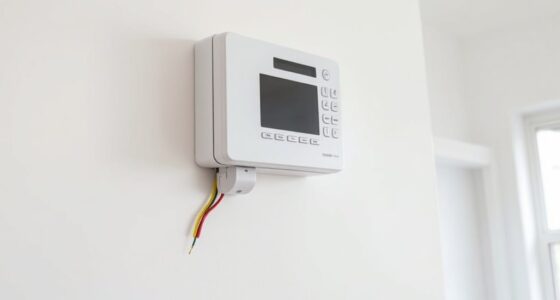Understanding alarm permits and local regulations helps you stay compliant and guarantees emergency responders can assist you efficiently. Many communities require permits to operate alarm systems legally, which can involve application forms, fees, and renewal processes. Having the right permit reduces false alarms, avoids fines, and facilitates quicker response times during emergencies. Staying informed about your local rules keeps your system running smoothly. Keep exploring, and you’ll discover how these regulations can protect you and your property effectively.
Key Takeaways
- Alarm permits ensure responsible use, reduce false alarms, and demonstrate compliance with local regulations.
- The application process typically involves submitting detailed alarm information and paying a fee.
- Permits help authorities identify responsible parties during alarms and manage false alarm limits.
- Maintaining and renewing permits regularly is essential to avoid fines and ensure proper emergency response.
- Understanding local regulations and industry standards helps prevent penalties and ensures effective alarm system operation.

Have you ever wondered whether your local community requires a permit for your alarm system? Many cities and towns have specific regulations to ensure alarm systems are used responsibly and don’t cause unnecessary disruptions. Understanding these rules can save you time, money, and frustration, especially when it comes to false alarm reduction. Most areas have a permit application process that you need to follow before installing or activating your alarm system. This process typically involves filling out forms with details about your alarm’s type, location, and the contact information of the responsible parties. Once approved, obtaining a permit shows that you’re compliant with local regulations and helps authorities coordinate responses more effectively.
Many communities require alarm permits to ensure responsible use and reduce false alarms.
The permit isn’t just a bureaucratic step—it’s a crucial part of false alarm reduction efforts. When authorities know who is responsible for an alarm, they can respond more accurately and avoid dispatching emergency services unnecessarily. Many jurisdictions have established limits on the number of false alarms allowed within a certain period. If you exceed these limits, you might face fines or additional requirements. That’s why understanding and following the permit application process is essential; it helps you keep your alarm system within legal parameters, reducing the chances of false alarms and associated penalties.
The process typically starts with a visit to your local police or fire department’s website, where you can find the necessary forms and instructions. Some areas also allow you to apply online, which can save you time. During the application, you’ll be asked to provide details about your alarm system, including the type of system, the location, and how it’s monitored. You may also need to register the contact information of the person responsible for the alarm, such as a homeowner or security company. Once you submit your application, you might have to pay a fee, which varies depending on your location. After approval, you’ll receive a permit that must be posted visibly at your property or kept accessible in case authorities request verification.
Additionally, understanding merchant services and associated regulations can help ensure your alarm system provider complies with industry standards for security and data privacy. It’s important to keep your permit current; many jurisdictions require renewal annually or biennially. Failing to renew or update your permit can lead to fines or complications during emergency responses. Plus, adhering to permit regulations helps bolster false alarm reduction strategies, making emergency services more efficient and reducing unnecessary dispatches. Being proactive about understanding your local permit requirements and completing the permit application process demonstrates your commitment to community safety and compliance. It also helps you avoid penalties and ensures your alarm system functions effectively without causing disruptions for your neighbors or emergency responders.
Frequently Asked Questions
How Do I Renew My Alarm Permit Annually?
To renew your alarm permit annually, you should first check your city’s renewal reminders, which often arrive by mail or email. Pay the alarm permit fees promptly online or in person to avoid penalties. Make sure to renew before the expiration date to maintain your permit’s validity. Staying on top of renewal reminders helps you avoid service interruptions and guarantees you’re compliant with local regulations.
Are There Penalties for False Alarm Violations?
False alarm fines can lead to permit suspension, so yes, there are penalties for false alarm violations. You might face financial charges and even lose your permit if false alarms happen repeatedly. While alarms are meant to protect, frequent false alarms create inconvenience and unnecessary emergency responses. To avoid permit suspension and fines, verify your alarm system is properly maintained and used correctly, reducing false alarms and keeping your permit in good standing.
Can I Get a Permit for a Home Security System?
Yes, you can get a permit for your home security system. To do so, you need to complete an alarm installation permit application through your local authorities. This process helps guarantee your security system complies with regulations and reduces false alarms. Once approved, you’ll receive a permit that allows you to install and operate your alarm system legally, helping you avoid penalties and ensuring your safety measures are official.
What Documentation Is Needed to Apply for a Permit?
Think of applying for your alarm permit as gathering a toolbox before a project. You’ll need alarm documentation, such as proof of system installation and technical details. Permit requirements often include a completed application form, proof of system compliance, and sometimes a fee. Make sure to check your local regulations, so you gather all the necessary documents and avoid delays, like missing tools in your toolbox.
How Do I Change My Alarm Service Provider?
To change your alarm service provider, start by reviewing your current service contract terms to understand any cancellation policies or fees. Next, contact your new provider to set up alarm system upgrades and guarantee compatibility. Once scheduled, notify your current provider to cancel the service. Finally, update any alarm permits or registrations with local authorities if required, facilitating a smooth transition without disruptions or penalties.
Conclusion
Understanding alarm permits and local regulations helps you stay compliant, stay protected, and stay stress-free. By knowing the rules, you avoid fines, prevent false alarms, and ensure your security system functions smoothly. Staying informed means you’re prepared, responsible, and confident. Remember, permits are your responsibility, regulations are your guide, and safety is your goal. Embrace these steps, follow these rules, and enjoy peace of mind every day.









